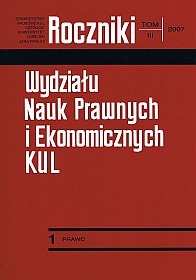The Activities of the Legislative Sejm of 1919-1922. Relating to Remuneration for the Clergy and Church Servants
Abstract
In this article the author presents a number of essential issues concerning the endowment of the Church, which the members of the Legislative Sejm worked on. The argument begins by stating that Church possessions were confiscated illegally by the governments of the occupant states. An important deduction is made that the endowment of the Church was closely related to the hotly debated agrarian reform conducted with reference to ecclesiastical possessions.
In his dissertation, the author presents opinions of many members of Parliament who insisted on a bill which would improve the material conditions of the clergy. It is worth noticing, however, that what they had in mind was the poor clergy in the eastern borderlands of the Republic of Poland. On the opposing side, the author mentions the point of view of those who were against maintaining the Church by the State. Also presented are the arguments of the supporters of the State maintenance of Catholic clergy. Their main argument was the fact that clergy has always played a major role in Polish history. Clergymen were described as promoters and advocates of Poland. The author of the text juxtaposes the opposing view of the supporters and adversaries of the bill which would regulate the discussed issues.
Having investigated the above problems and analyzing them in the context of various issues, the author presents in a brief outline the material situation of Catholic clergy in the first years of the independence of the Second Republic of Poland. Debates and conclusions from the described issues, as well as the opinions of the Sejm members are also presented in the text.
References
Ajnenkiel A., Historia sejmu polskiego, t. II, cz. 2: II Rzeczpospolita, Warszawa 1989.
Bartel K., Kilka uwag o pracy parlamentarnej, Warszawa 1929.
Bujak F., Uwagi krytyczne o naszej reformie rolnej, Warszawa 1921.
Gołębiowski S., Uwagi o reformie rolnej dóbr kościelnych w Polsce przedwrześniowej, „Państwo i Prawo” 1967, nr 22, z. 6, s. 983-992.
Jachynek J., Charakterystyka składu osobowego Sejmu i Senatu w II Rzeczypospolitej, w: Rola posła i senatora w II Rzeczypospolitej, red. J. Jachymek, Lublin 1989, s. 9-46.
Jurkiewicz J., Watykan a stosunki polsko-niemieckie w latach 1918-1939, Warszawa 1960.
Krukowski S., Sejm Ustawodawczy 1919-1922. Uwagi o składzie i działalności, „Czasopismo Prawno-Historyczne” 38(1986), z. 1, s. 93-109.
Nowodworski L., O pierwszym Sejmie polskim, Warszawa 1918.
Próchnik A., Pierwsze piętnastolecie Polski niepodległej, Warszawa 1983.
Stankiewicz W., Sprawa reformy rolnej w Sejmie Ustawodawczym RP w 1919 r. „Roczniki Dziejów Ruchu Ludowego” 1961, nr 3, s. 50-71.
Urban W., Kościół wobec reformy rolnej, w: Kościół w II Rzeczypospolitej, red. Z. Zieliński, S. Wilk, Lublin 1980.
Wilk S., Episkopat Kościoła katolickiego w Polsce 1918-1939, Warszawa 1992.
Zaporowski Z., Sejm Rzeczypospolitej Polskiej 1919-1939. Działalność posłów, parlamentarne koncepcje Józefa Piłsudskiego, mniejszości narodowe, Lublin 1992.
Zwoliński W., Polski Sejm Konstytucyjny czyli „konstytuanta”, Warszawa 1918.
Copyright (c) 2007 Roczniki Wydziału Nauk Prawnych i Ekonomicznych KUL

This work is licensed under a Creative Commons Attribution-NonCommercial-NoDerivatives 4.0 International License.

